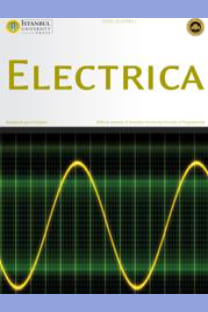Cognitive AF Relay Networks over Asymmetric Shadowing/Fading Channels in the Presence of Low-Rate Feedback
DOI: 10.26650/electrica.2018.65047This study investigates the performance of
a cognitive amplify-and-forward (AF) relay network over composite asymmetric
multipath/shadowing fading channels, whereby a new power allocation method is
adopted at the secondary source and relay, assuming the mean-value interference
channel. To quantify the performance of the proposed structure, closed-form
outage probability and ergodic capacity expressions are derived. Moreover,
asymptotic ergodic capacity analysis is performed to observe the effects of
limited feedback and fading/shadowing severity in the system. The analytical
results are validated with Monte-Carlo simulations, and they show that the
proposed structure can be a realistic scenario for next-generation wireless
systems, and a system designer can test the overall performance of the proposed
system without dealing with complex prototypes.
Anahtar Kelimeler:
Cognitive radio, multipath/shadowing fading channels, cooperative communication
Cognitive AF Relay Networks over Asymmetric Shadowing/Fading Channels in the Presence of Low-Rate Feedback
DOI: 10.26650/electrica.2018.65047This study investigates the performance of a cognitive amplify-and-forward (AF) relay network over composite asymmetric multipath/shadowing fading channels, whereby a new power allocation method is adopted at the secondary source and relay, assuming the mean-value interference channel. To quantify the performance of the proposed structure, closed-form outage probability and ergodic capacity expressions are derived. Moreover, asymptotic ergodic capacity analysis is performed to observe the effects of limited feedback and fading/shadowing severity in the system. The analytical results are validated with Monte-Carlo simulations, and they show that the proposed structure can be a realistic scenario for next-generation wireless systems, and a system designer can test the overall performance of the proposed system without dealing with complex prototypes.
___
- 1. C. X. Wang, F. Haider, X. Gao, X. H. You, Y. Yang, D. Yuan, H. M. Aggoune, Harald Haas, s. Fletcher, “Cellular architecture and key technologies for 5G Wireless Communication Networks”, IEEE Commun Mag, vol. 52, no. 2, pp. 122-130, 2014.
- 2. A. Goldsmith, S.A. Jaffar, I. Maric, S. Srinivasa “Breaking spectrum gridlock with cognitive radios: An information theoretic perspective”, Proceedings of the IEEE, vol. 97, no. 5, pp. 894-914, 2014.
- 3. X. Tao, X. Xu, Q. Cui, “An Overview of Cooperative Communications”, IEEE Commun Mag, vol. 50, no. 6, pp. 65-71, 2012.
- 4. E. Dahlman, S. Parkvall, J. Skold, P. Beming, “3G Evolution: HSPA and LTE for Mobile Broadband”, New York, Academic Press, 2010.
- 5. T. Q. Duong, V. N. Q. Bao, H.-J. Zepernick, “Exact outage probability of cognitive AF relaying with underlay spectrum sharing”, Electron Lett, vol. 47, no. 17, pp. 1001-1002, 2011.
- 6. T. Q. Duong, D. B. da Costa, M. Elkashlan, V. N. Q. Bao, “Cognitive amplify-and-forward relay networks over Nakagami-m fading”, IEEE Trans Veh Technol, vol. 61, no. 5, pp. 2368-2374, 2012.
- 7. C. Zhong, T. Ratnarajah, K.K. Wong, “Outage analysis of decode-and-forward cognitive dual-hop systems with the interference constraint in Nakagami-m fading channels”, IEEE Trans Veh Technol, vol. 60, no. 6, pp. 2875-2879, 2011.
- 8. H. Ding, J. Ge, D.B. da Costa, Z. Jiang, “Asymptotic analysis of cooperative diversity systems with relay selection in a spectrum sharing scenario”, IEEE Trans Veh Technol, vol. 60, no. 2, pp. 457-472, 2011.
- 9. R. Zhao, Y. Yuan, L. Fan, Y.C. He, “Secrecy performance analysis of cognitive decode-and-forward relay networks in Nakagami-m fading channels”, IEEE Trans Veh Technol, vol. 65, no. 2, pp. 547-563, 2017.
- 10. D. Chen, Y. Chang and W. Yang, “Physical layer security in cognitive untrusted relay networks”, IEEE Access, vol. 6, pp. 7055-7065, Oct. 2017.
- 11. J. Yang, L. Chen, X. Lei, K. Peppas, T.Q. Duong, “Dual-hop cognitive amplify-and-forward relaying networks over η-μ fading channels”, IEEE Trans Veh Technol, vol. 65, no. 8, pp. 6290-6300, 2016.
- 12. M. Li, H. Yin, Y. Huang, Y. Wang, “Impact of correlated fading channels on cognitive relay networks with generalized relay selection”, IEEE Access, vol. 6, pp: 6040-6047, 2017.
- 13. P.S. Bithas, N.C. Sagias, P.T. Mathiaopoulos, G.K. Karagiannidis, A. A. Rontogiannis, “On the performance analysis of digital communications over generalized-K fading channels”, IEEE Commun Lett, vol. 10, no. 5, pp. 353-355, 2006.
- 14. I. S. Gradshteyn, I.M. Ryzhik, “Table of integrals, series and products,” 7th ed. New York: Academic Press, 2007.
- 15. K.B. Oldham, J. Myland, J. Spanier, “An atlas of functions”, 2nd ed. Berlin, Germany: Springer-Verlag, 2008.
- 16. Y. Ma, D. Zhang, A. Leith, Z. Wang, “Error performance of transmit beamforming with delayed and limited feedback.”, IEEE Trans. Wireless Commun, vol. 8, no. 3, pp: 1164-1170, 2009.
- ISSN: 2619-9831
- Yayın Aralığı: 3
- Başlangıç: 2001
- Yayıncı: İstanbul Üniversitesi-Cerrahpaşa
